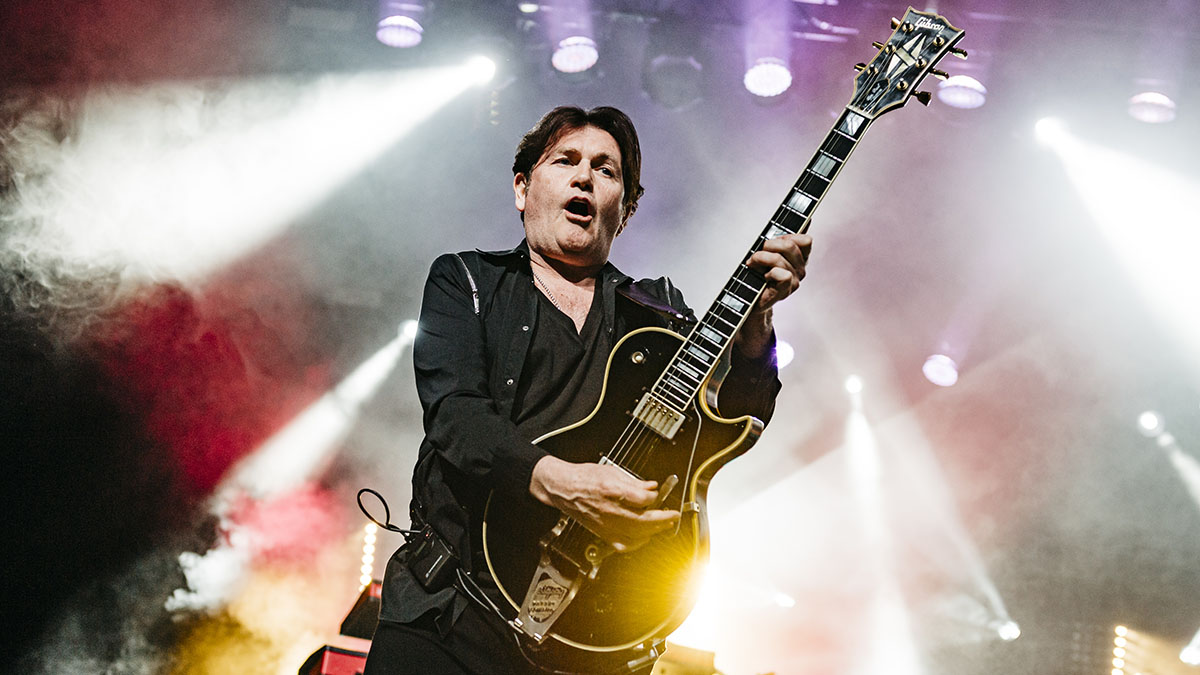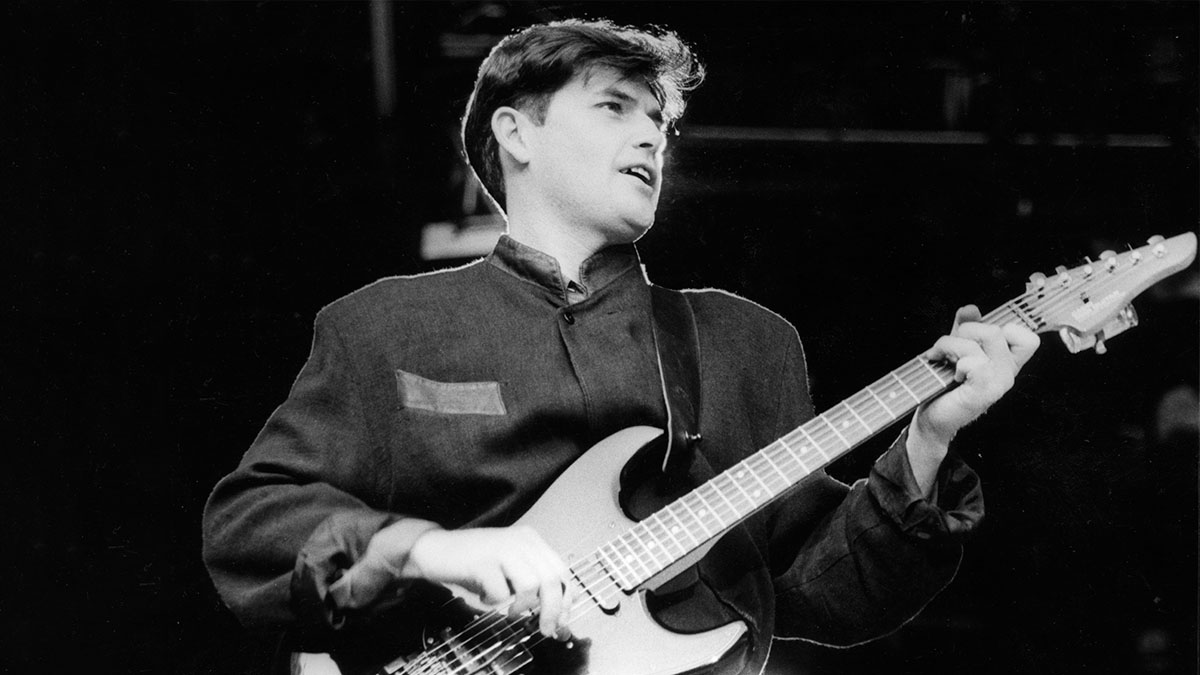Simple Minds’ Charlie Burchill: “Edge had his AC30, his delays and his black Strat. I picked up his Strat – and I sounded like Edge! I thought, ‘Jesus, it’s in the gear as well…’”
The Glasgow guitar legend talks vintage Gretsch, the rise of Simple Minds as a pop behemoth, eschewing powerchords, and what happens when you play through the Edge's epic rig

He’s the Glasgow guitar maverick who broke into the 80s stadium league with Simple Minds. Now, as the band return with 18th album, Direction Of The Heart, Charlie Burchill tells us about pushing the envelope, falling for the White Falcon, commandeering the Edge’s rig, and why you won’t catch him playing powerchords…
Sparking up
“My very first guitar, my mother got me when I was maybe nine. It’s a true story – she bought me this guitar with coupons from Embassy cigarette packets! I started playing when I was about 12. I had two older brothers: one of them, he fancied playing guitar and bought a semi-decent one that I eventually nicked off him. He gave up and I carried on.”
Local heroes
“Jim [Kerr] and I, we joined Johnny and the Self Abusers in 1977. The punk scene was flourishing in Glasgow and it created so many opportunities for everybody. We didn’t really come from a punk background – Jim and I were much more into The Doors, Velvet Underground and Roxy Music – but it was our doorway in.
“Sadly, it killed off a lot of older artists, but punk gave people the chance. Even if you weren’t proficient, you could believe that you could actually play in a band. At the end of Johnny and the Self Abusers, Jim and I went on to start a new band, and that was Simple Minds.”
Simple pleasures
“My early Simple Minds rig was really simple. I was using a transistor Carlsbro – there wasn’t a great deal of stuff going on. But I always had the delay – that was really important. We hooked up with a guy who worked with us for years, and he was a technical wizard who used to put together pedalboards for me with all sorts of different variations. We would just experiment. It was all a bit makeshift, but it got us to where we wanted to be.”
High flyer
“I never knew much about Gretsch, but in the early ’80s, we started playing America and I came across the White Falcon. It’s such a beautiful guitar, that was the original attraction. The White Falcon is not the easiest to play, but I realised that Gretsch is something that suited me because it speaks really well, no matter how distorted it is.
“With the older ones, you can hear how good they sound without even plugging in, and if it’s good from the source then it’s going to be good when it’s amplified. Now I collect Gretsches and I’ve got a couple I still use today. But it’s crazy to think that in 1982, White Falcons were $600…”
Get The Pick Newsletter
All the latest guitar news, interviews, lessons, reviews, deals and more, direct to your inbox!

Sound & vision
“I hated the straightforward guitar stuff. I never liked the idea of powerchords and just giving the song a bit of body. I was never a big fan of AOR American rock stuff. I was coming from a slightly more psychedelic background.
“Somebody like Robby Krieger in The Doors, he can play blues and he’s playing what you could say is ‘conventional’ guitar, but when you go a bit deeper, you realise it’s quite out-there, actually, and probably coming more from a slightly jazz background.
“Technology changed the game massively for guitar players. Suddenly, from being a guitar and an amp, three chords and the truth, you could go into a different realm completely. And as soon as I found effects, that’s where I was going.”
Coming up
“Being on The Old Grey Whistle Test in 1979 was pretty daunting because it was a serious music programme, but it felt like we had arrived somewhere, finally. Looking back, we were dreadful, but there you go, that’s just [how it is] at that age. It was very gradual, our success.
“We did have moments when it jumped a few levels, but by and large, it was always a work in progress. We were great mates and for the first part of the ’80s we were really enjoying the travelling and being out of Glasgow. We had a great manager at the time, Bruce Findlay, who was like this father figure, making sure you kept your feet on the ground and didn’t get [egotistical].”
Double or quits
“In the early ’80s, Arista [Records] were gonna drop us and we thought, ‘Okay, this is where it gets really tough.’ But we had a friend at Virgin who was pushing to get Branson to sign us. Eventually, they came up to Glasgow and signed us that afternoon.
I don’t understand why people would buy new guitars when they could pick up a ’60s Gretsch for the same money. It’s mad
“The first thing we gave them was Sons and Fascination/Sister Feelings Call [1981], which was a double album – which was at that time anathema to everybody. Not only that, it was quite abstract. They suggested we work with Steve Hillage, which was really out of the box because Steve was the prog guy from Gong and his own records.
“So we were thinking, ‘How is that going to work?’ But it was brilliant, actually, and it allowed us so much freedom. We had 18-minute songs that we edited down to three-and-a-half. It was quite a mad period. We never, ever stuck to the formula. And you could do that in those days. You couldn’t do it now.”
’Paul bearer
“The first band I ever saw play live was Led Zeppelin, so I had to get a Les Paul. Couldn’t afford it, tried to make one – then I bought a copy. But the thing was, I didn’t really know much about Les Pauls, in terms of the different years and what makes them good or bad. And it’s very subjective because, actually, I quite like a lot of the heavier Les Pauls from the early ’70s, which a lot of people don’t like.
“But I play one live, which is an early ’70s and I love it. Just a brilliant sound. A friend of mine bought a ’59 in mint condition. The closest I’ve got to that was two of those Gibson ’59 True Historic reissues. They’re really great – I can only imagine what a real ’59 is like.”

Good vintage
“I’ve got a lot of old Fenders, and the difference between a ’50s Telecaster and something from the ’70s is astronomical. Years ago, I brought a ’55 Gretsch Duo Jet and when you pick it up, it’s really light; it feels like something not that substantial, but it’s just incredible.
“For me, I don’t understand why people would buy new guitars when they could pick up a ’60s Gretsch for the same money. It’s mad. Personally, I would just go for a 60-something model and try to get something that isn’t going to cost you the earth. Recently, like everything else, guitars have just got ridiculous, the vintage thing has got ridiculous.
“They’ve gone up at least 30 per cent for no reason. But y’know, I bought a ’65 Country Gent for 1,500 quid and it’s a fantastic guitar. And recently, I got a ’62 Jaguar; it was refinished and, of course, that means the value’s not there, but it’s an amazing guitar.”
Breakfast of champions
“We didn’t write Don’t You (Forget About Me). The thing was, the record company had been on our back for a long time to do this song. It wasn’t that we didn’t like it. It was just that, at the time, we’d just written an album [1985’s Once Upon A Time], we were going to work with Jimmy Iovine and we felt that we had real songs there – y’know, we had three Top 5 hits in the States from that album.
“So our nose was a bit out of joint that they were after this particular track that we didn’t write. It was going to be in The Breakfast Club – a movie about American high school kids and detention, which we couldn’t relate to. So we had a bit of an attitude about it. But then we met the guy who wrote it, Keith Forsey, and absolutely loved him. We just went with it, rattled the song out in an afternoon – and there you go, Murphy’s law.”
Close to the Edge
“When you look back, the ’80s were so diverse. There was a period when we were always being lumped into a box with U2, even though we don’t sound anything like each other.
“We first met those guys in the ’70s and we became great friends immediately. I remember, in the mid-’80s, I was in the studio in Ireland with U2, and Edge had his Vox AC30, his delays and his black Strat in there.
“I said to him, ‘Give us a shot!’ I picked up his Strat – and I sounded like Edge! By the way, it was the best fucking guitar sound I’ve ever heard. It just sounded unbelievable. I remember thinking, ‘Jesus, it’s in the gear as well…’”
Street fighting men
“Street Fighting Years [1989] was an interesting album. We loved the records that Trevor Horn and Stephen Lipson were making, and they wanted to work with a bona fide band. Trevor’s quite adventurous, so we set up a studio in a house in the Scottish Highlands and things would just happen.
“For example, with the track This Is Your Land, Jim said, ‘Wouldn’t it sound great if Lou Reed sang on that?’ And Trevor and Steve would say, ‘Well, let’s see if he’s up for it!’ And he did it. Then Trevor said, ‘You should do an old traditional Celtic song.’ We were thinking, ‘Really? That’s too obvious,’ but as it turns out, that’s how Belfast Child came out. We had toured with Peter Gabriel so we did his song Biko.
“We were working with different musicians like Stewart Copeland and Manu Katché. Before we knew it, we had this album that had great big moments… and then there’s other parts where we just felt like we had missed, we never quite got it. But we’re not the judge of that. For a lot of people, Street Fighting Years is their favourite album.”
The devil you know
“There were a few guitar players I love that play SGs, but I never got on well with them myself. I always found the balance too weird. But I started hearing this thing on records that I recognised as an SG sound and I realised there were a few things we were doing where that’s the guitar I should have been using.
“Like Alice Cooper’s early bands, or Zal Cleminson from The Sensational Alex Harvey Band, even Sister Rosetta Tharpe – you listen to her clipped playing and you think, ‘That’s an SG.’
The White Falcon is not the easiest to play, but it suited me because it speaks really well, no matter how distorted it is
“So about four years ago, I bought a 1962 white SG with the three pickups and the standard Vibrola, not the sideways one. And the sound of that guitar is just completely different – it’s got a bite to it that you don’t get with a Les Paul. It’s got an attack. And there’s something about the three-pickup [format].
“It’s quite weird when you’re playing it – because you’ve not got that space for your right hand because the pickups are there, so you play differently. Funnily enough, I just decided last week that I was going to use the SG a lot more in our live set.”
From the heart
“With the new Simple Minds album, Direction of the Heart, we worked on about 25 songs and didn’t really know what kind of record we were making. It was more about making sure the tracks cover all the things we find important, like energy, melodies and that it’s going to work live.
“There are a few things that are slightly different territory for us and a bit more playful. We just said, ‘Well, this feels good, and we’ll learn about it as we go on.’ You make a record and then you find out what you’ve made a year or two later.
“It sounds trite, but there’s a point where it doesn’t belong to you any more. When it’s gone out and people have listened to it, then it’s their record – it’s kind of got nothing to do with us any more.”
- Direction of the Heart is out now on BMG.
Jamie Dickson is Editor-in-Chief of Guitarist magazine, Britain's best-selling and longest-running monthly for guitar players. He started his career at the Daily Telegraph in London, where his first assignment was interviewing blue-eyed soul legend Robert Palmer, going on to become a full-time author on music, writing for benchmark references such as 1001 Albums You Must Hear Before You Die and Dorling Kindersley's How To Play Guitar Step By Step. He joined Guitarist in 2011 and since then it has been his privilege to interview everyone from B.B. King to St. Vincent for Guitarist's readers, while sharing insights into scores of historic guitars, from Rory Gallagher's '61 Strat to the first Martin D-28 ever made.
Guitar World Discussion: Who is the most underrated guitar player of all time?
Ozzy Osbourne’s solo band has long been a proving ground for metal’s most outstanding players. From Randy Rhoads to Zakk Wylde, via Brad Gillis and Gus G, here are all the players – and nearly players – in the Osbourne saga










